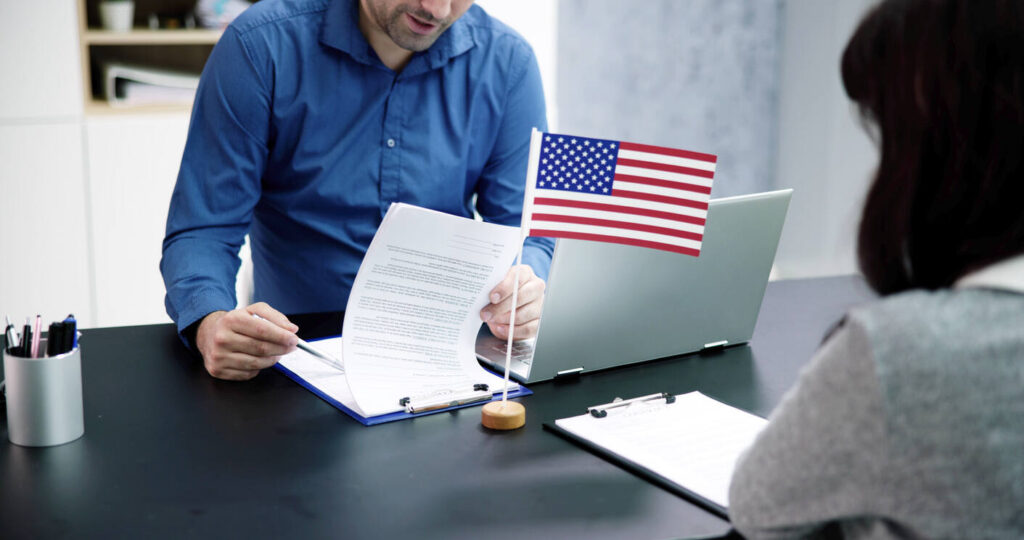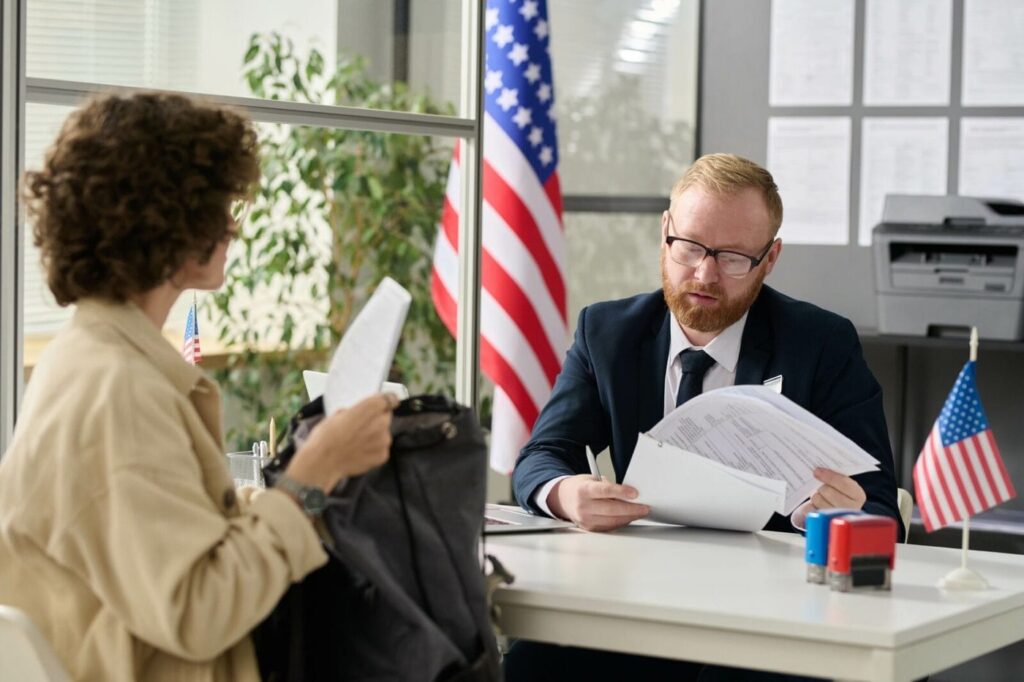You’re 45 minutes away from losing everything.
Not your money. Not your career. But something you can’t rebuild with another visa application or appeal, your chance to become an American citizen.
After years of proving your worth through O-1 or EB-2 visas, after building a life here, after paying taxes and following every rule, you’re now sitting in a waiting room. Your palms are sweating. Your heart is racing. And one question keeps looping in your mind: what questions do they ask in a citizenship interview, and what if I say the wrong thing?
Here’s what nobody warned you about: what questions do they ask in a citizenship interview isn’t just about memorising answers. It’s about understanding that the officer across from you has already decided whether you’re telling the truth before you even open your mouth. They’ve read your file. They’ve spotted inconsistencies you didn’t know existed. And they’re trained to watch for one thing: hesitation.

One wrong answer. One inconsistent date. One nervous pause when they ask about that trip you took three years ago. That’s all it takes to trigger a denial that could end your American dream permanently.
This isn’t a formality. This is the moment where everything you’ve built can disappear, or become permanent.
This article will show you exactly what questions they ask in a citizenship interview, what they’re really testing when they ask each one, and how to prepare so you walk out of that room as a future American citizen, not another denial statistic.
Read Also: What to Wear to Citizenship Interview: 7 Winning Secrets
Why the Citizenship Interview Is Different (And Why You Should Care)
If you came to America on an O-1 or EB-2 visa, you already know how to jump through hoops. You’ve proven extraordinary ability. You’ve shown that your work benefits the United States. You’ve assembled recommendation letters, compiled evidence, and sat through visa interviews.
But the citizenship interview is different.
This time, they’re not just checking your credentials. They’re checking your consistency, your honesty, and your fit as a future American citizen. They’re looking for red flags. And they’re trained to spot them.
The questions they ask seem simple on the surface. But every answer you give gets measured against your N-400 form, your immigration history, and your A-File (the record of every interaction you’ve had with immigration authorities). One mismatch, even an innocent one, can trigger deeper questioning or even a denial.
That’s why understanding what questions do they ask in a citizenship interview isn’t enough. You need to know what they’re really asking and what they’re looking for in your response.
What Questions Do They Ask in a Citizenship Interview? The Complete Breakdown
Let’s get to it. Here are the questions USCIS officers typically ask, organised by category. But more than that, I’ll tell you what they’re really testing when they ask each one.
1. Basic Personal Questions (Testing Your English and Consistency)
These seem obvious, but don’t get comfortable:
- What is your name?
- When is your birthday?
- Where were you born?
- What is your current address?
What they’re really doing: Testing your spoken English and checking if your answers match your N-400 form. If you recently moved and didn’t update your address, this is where you’ll get caught.
2. Family History Questions (Looking for Immigration Violations)
- Are you married, single, divorced, or widowed?
- What is your spouse’s name?
- When and where did you get married?
- Is your spouse a U.S. citizen?
- How many children do you have?
- Where do your children live?
What they’re really doing: Checking for marriage fraud, undisclosed dependents, or inconsistencies in your family history. If you got divorced since filing your N-400, you need to disclose this immediately.
3. Travel History Questions (Testing Your Physical Presence)
- How many times have you left the United States since becoming a permanent resident?
- Did any trip last six months or longer?
- When was your last trip outside the U.S.?
What they’re really doing: Verifying you meet the physical presence requirement. If you’ve been travelling frequently for work, they may question whether you’ve abandoned your U.S. residence.
4. Employment and Tax Questions (Checking Your Financial Responsibility)
- Where do you currently work?
- Have you filed all required tax returns?
- Do you owe any taxes?
What they’re really doing: Assessing your “good moral character.” If you haven’t filed taxes or owe back taxes, your application is at serious risk.
5. The “Good Moral Character” Questions (Where Things Get Serious)
These are the questions that can end your application:
- Have you ever claimed to be a U.S. citizen?
- Have you ever voted in a U.S. election?
- Have you ever been arrested or charged with a crime?
- Have you ever been a member of the Communist Party or any terrorist organisation?
- Have you ever lied to a USCIS officer?
What they’re really doing: Looking for disqualifying factors. Even a minor arrest you forgot about can become a problem if it’s not disclosed. If you answer “yes” to any of these, you need legal help immediately.
6. The Civics Test and English Test (Proving You Belong)
You’ll be asked up to 10 questions from a list of 100 civics questions. You must answer at least 6 correctly. You’ll also be asked to read and write a simple sentence in English.
What they’re really doing: Making sure you understand the American government and can function in English. This part is straightforward if you’ve studied, but nerves can make you freeze up.
7. The Oath Questions (Final Loyalty Check)
- Do you support the U.S. Constitution?
- Are you willing to take the Oath of Allegiance?
- Would you be willing to defend the United States if necessary?
What they’re really doing: Confirming your commitment to the United States. These are yes-or-no questions, but hesitation can raise concerns.

What Other Articles Don’t Tell You: The Hidden Traps
Now here’s what most guides won’t tell you about what questions do they ask in a citizenship interview.
The Questions Behind the Questions
USCIS officers are trained interrogators. They don’t just ask questions; they watch how you answer. Are you confident or nervous? Do you hesitate? Do you look away when answering certain questions?
For example, when they ask “Have you ever been arrested?” they’re not just listening for a yes or no. They’re watching your body language. They’re noting if you pause too long before answering.
The Follow-Up Questions You Didn’t Prepare For
If your initial answer raises a red flag, the officer will dig deeper. Let’s say you mention a trip abroad that lasted more than six months. The follow-up might be:
- Why did you stay so long?
- Where exactly were you during that time?
- Do you have documentation proving you maintained ties to the U.S.?
If you can’t answer these follow-ups convincingly, your application is in trouble.
The Documents They Might Ask to See (On the Spot)
The officer can request additional documentation during the interview. This might include:
- Tax returns for the past five years
- Proof of current employment
- Divorce decrees
- Children’s birth certificates
- Court documents for any arrests
If you don’t have these documents with you, the interview might be postponed, or worse, your application could be denied.
How the Interview Actually Flows (So You’re Not Blindsided)
Most guides give you a list of questions, but they don’t tell you what the actual interview feels like. Here’s what happens:
Step 1: The Greeting (Your English Test Starts Here)
The moment the officer greets you, your English test begins. They’re listening to how you respond to “How are you today?” This isn’t small talk, it’s an assessment.
Step 2: The Oath
You’ll be placed under oath. They’ll ask if you understand what an oath means. Answer clearly: “Yes, I understand.”
Step 3: The N-400 Review
The officer will go through your N-400 form line by line, asking you to confirm or clarify information. This is where inconsistencies get caught. If you moved since filing, changed jobs, or got divorced, this is when you disclose it.
Step 4: The Civics and English Tests
You’ll be asked up to 10 civics questions and asked to read and write a sentence. If you pass 6 out of 10, you’re done with this section.
Step 5: The Decision
In most cases, you’ll be told on the spot whether you passed. If there are issues, the officer will explain what happens next.
What Happens If You Mess Up (And How to Recover)
Here’s the part that scares most people: what if you give the wrong answer?
First, understand this: making a mistake doesn’t automatically mean denial. But how you handle it matters.
If You Realise You Gave a Wrong Answer:
Stop and correct yourself immediately. Say, “I’m sorry, I need to correct my previous answer.” The officer will appreciate your honesty.
If You Don’t Understand a Question:
Ask for clarification. It’s better to ask than to guess and get it wrong. Say, “I’m sorry, could you repeat that question?” or “I’m not sure I understand what you’re asking.”
If You Can’t Remember Something:
Be honest. Say, “I don’t remember the exact date, but I can provide documentation after this interview.” Never guess or lie.
How to Prepare So You Don’t Fail
Now that you know what questions do they ask in a citizenship interview, here’s how to prepare:
- Review your N-400 form multiple times. Know every answer you gave. If anything has changed, be ready to explain it.
- Study the civics questions. There are 100 questions. Study all of them. You need to answer 6 out of 10 correctly.
- Practice speaking English. If English isn’t your first language, practice common interview phrases and responses.
- Gather all required documents. Bring originals and copies of everything listed in your interview notice, plus extras just in case.
- Do a mock interview. Practice with someone who can play the role of the USCIS officer. Get comfortable answering questions under pressure.
- Check your tax situation. Make sure you’ve filed all returns and paid all taxes. If you owe money, pay it before the interview.
- Review your travel history. Go through your passport stamps and create a list of all trips you’ve taken since getting your green card.
Why High Achievers Like You Need Extra Support
You didn’t get your O-1 or EB-2 visa by being average. You built something exceptional. But here’s the problem: Citizenship interviews don’t care about your achievements. They care about paperwork, dates, and consistency.
And after years of building your life in America, one administrative mistake can put everything at risk.
That’s where preparation makes the difference. Not generic preparation, strategic, personalised preparation that accounts for your specific situation as a high-achieving professional.
How Veripass Helps You Get This Right
This is where Veripass comes in.
Veripass specialises in helping high-achieving professionals like you navigate complex immigration processes. Whether you came to the U.S. on an O-1 visa or through the EB-2 NIW pathway, Veripass understands the unique challenges you face.
Here’s what makes Veripass different:
Personalised Interview Preparation
Veripass doesn’t give you generic advice. They review your entire immigration history, identify potential red flags in your application, and prepare you for the specific questions you’re likely to face based on your circumstances.
Mock Interview Sessions
You’ll go through realistic mock interviews conducted by immigration experts who know exactly what USCIS officers look for. They’ll ask the hard questions, point out where you’re weak, and help you refine your answers.
Document Review and Organisation
Veripass makes sure you have every document you need, properly organised and ready to present. No scrambling at the last minute. No missing paperwork.
Strategy for Complex Cases
Suppose you have anything unusual in your history. In that case, gaps in employment, extended trips abroad, previous visa denials, and tax issues, Veripass develops a strategy to address these proactively before they become problems in the interview.

Post-Interview Support
If your case requires additional documentation or if you face an RFE (Request for Evidence), Veripass helps you respond quickly and correctly.
For O-1 and EB-2 visa holders specifically, Veripass understands the transition from temporary status to permanent residency to citizenship. They know the questions officers ask high achievers. They know how to position your accomplishments without sounding arrogant. They know how to explain frequent international travel for work without raising abandonment concerns.
Your Next Step: Don’t Leave This to Chance
You’ve invested too much to risk it now.
Understanding what questions do they ask in a citizenship interview is the first step. But knowing the questions isn’t the same as being prepared to answer them under pressure, in front of an officer who has the power to deny your application.
You need more than preparation. You need a strategy. You need someone in your corner who understands your specific situation and can help you present your case in the strongest possible way.
Veripass offers exactly that.
Book a consultation with Veripass today. Their team will review your case, identify potential issues, and create a personalised preparation plan that gives you confidence walking into that interview room.
Don’t wait until the day before your interview to realise you’re not ready. Don’t let one wrong answer undo years of work.
Visit the Veripass website and schedule your consultation now. Your citizenship depends on it.
What questions are asked in a U.S. citizenship interview?
USCIS officers ask questions from several categories during your citizenship interview. You’ll answer questions about your personal information (name, address, birthday), your family history (spouse, children, parents), your travel history since getting your green card, your employment and tax records, and your moral character. The officer will also ask if you’ve ever been arrested, claimed to be a U.S. citizen, or voted illegally. You’ll take a civics test where you answer 6 out of 10 questions correctly from a list of 100 questions about the U.S. government and history. Finally, you’ll be tested on your ability to speak, read, and write basic English. Most questions come directly from your N-400 application form, so the officer is checking if your answers match what you wrote.
How do I pass my citizenship interview?
Pass your citizenship interview by doing these things: First, review your N-400 form multiple times so you know every answer you gave. Second, study all 100 civics questions until you can answer at least 60 of them correctly. Third, practice speaking English if it’s not your first language. Fourth, bring all required documents, including your green card, passport, tax returns, and any court records if you’ve been arrested. Fifth, answer every question honestly. If you don’t understand something, ask the officer to repeat it. Don’t guess. Sixth, stay calm and speak clearly. The officer is watching your body language and listening to how you answer, not just what you say. If you realise you made a mistake, correct yourself immediately. Honesty matters more than perfect answers.
What is the hardest question in the citizenship test?
The hardest questions are not on the civics test; they’re the ones about your personal history that you didn’t prepare for. Questions like “Why did you take that six-month trip abroad in 2022?” or “You said you filed taxes every year, but we don’t have a record for 2021. Can you explain?” These catch people off guard because they require you to remember specific dates and details from years ago. On the civics side, questions about amendments, the judicial system, or specific historical events trip up many applicants. But the real difficulty comes when officers ask follow-up questions based on your answers. If something doesn’t match your paperwork, they’ll dig deeper until they’re satisfied or until they find a reason to deny your application.
What is the best answer for why you want to be a US citizen?
The best answer is honest and shows commitment to America. Say something like: “I want to become a U.S. citizen because this is my home now. I’ve built my career here, my family is here, and I want to fully participate in American society by voting and serving my community. I believe in the values this country represents, and I want to make it official.” Don’t overcomplicate it. Officers aren’t looking for a speech; they want to see that you genuinely want to be American, not just for convenience. Avoid answers like ‘for better job opportunities’ or because it’s easier to travel. Focus on belonging, commitment, and your connection to the United States. Keep it short, sincere, and specific to your situation.
